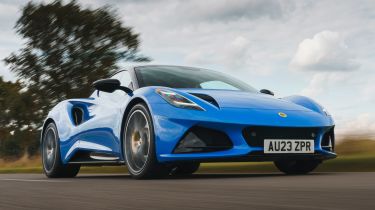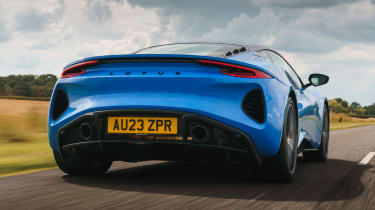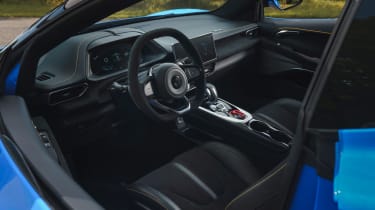New Lotus Emira i4 2023 review
We get behind the wheel of the last combustion Lotus ever. Is the new 4-cylinder Emira a worthy send-off?

Verdict
This new four-cylinder Emira is the best all-round Lotus. The steering is crisp and the car has a broad range of dynamic ability, but there’s no denying the motor sounds coarse, which you don’t expect, given the Emira’s rather high price.
This is the last new combustion-engined Lotus sports car. That’s a line that started with the Seven, captured the world’s imagination with the Elan, hit the silver screen with the Esprit, turned to the Elise for Lotus’s salvation, and all ends with this, the turbocharged four-cylinder Emira i4.
Developed alongside the Toyota-engined V6 Emira, the i4 takes the 2.0-litre turbo engine and gearbox from the Mercedes-AMG A 45 and squeezes them into the middle of the Emira, which requires a number of changes from the B-pillars back. These include a new, 12kg-lighter aluminium subframe, new shear panels, uprights, and wishbones, while the electronics also required significant changes.
In the Emira i4 the Mercedes-AMG unit produces 360bhp and 430Nm of torque, and the car can cover the 0-60mph sprint in 4.3 seconds. Its eight-speed double-clutch gearbox (no manual is offered, unlike with the V6) has, like the engine, been mapped to Lotus’s requirements.
As a powertrain package, it punches as hard as you’d expect for the numbers it turns out. It gets off the line with great energy that then builds as the revs climb. There’s a buzz and athleticism to its power delivery, too, as you hunt around the top end of its rev band for every opportunity to generate thrust.
However, for all its performance, it’s not the best-sounding engine. In fact, it’s quite coarse, and only when you switch to the Sport or Track modes does the exhaust note get better.
Used - available now

2024 Lotus
Emira
4,745 milesAutomaticPetrol2.0L
Cash £63,990The i4 also has an e-diff on its rear axle where the V6 doesn’t, and this delivers the engagement you expect from a Lotus and the safety net expected by those new to the brand. The presence of this is why, with a heavy-handed approach, you can enter a tight second-gear corner, apply full lock and open the throttle wide and still head in your intended direction without the systems shutting everything down. The ESC and the diff work very well together.
The level of confidence the Emira inspires allows you to really explore its talents, discovering both its and your own abilities. On the road it means you build momentum and flow. On track you push yourself harder, lean on its traction, work with its balance, and savour how it devours corners.
Our test car was equipped with the Sport chassis, which includes springs and dampers in the region of six to seven per cent stiffer than the Tour pack. On the road it results in a firmer ride than many will expect from a Lotus, because its locked-down chassis forgoes the float and fluidity the brand is known for in return for more precision and poise.
On track, however, the Sport chassis is at home. There’s enough movement in the body to feel the car adjust to your inputs and allow you to adapt accordingly. Its balance is delightfully neutral and messages are clearly telegraphed back to you. Retaining a hydraulic power-steering set-up (with an electric motor to power it) is key, and was a crucial decision in the car’s development. This was one thing Gavan Kershaw, who is responsible for how every Lotus model drives, insisted on.
The more miles you cover the more the Emira opens up to you, encouraging you to enjoy it. There are, however, a couple of annoying foibles.
The gearshift controls, which you’ll want to engage with, are switches rather than paddles, and are too small (and the steering wheel spokes they are fixed to are set too low on the rim). The seat still isn’t right either, being low on shoulder and hip support. A sports seat would fix this, as would proper-sized paddles.
The four-cylinder Emira operates in a small sector of the market, with only the Alpine A110 and Porsche 718 Cayman as genuine new competitors before you start heading down the used-supercar route.
In all three cars you have three different characters and personalities; the Alpine is the agile but edgy one, the Porsche the controlled and predictable one, while this new Lotus sits sweetly in the middle.
| Model: | Lotus Emira i4 |
| Price: | £81,495 |
| Engine: | 2.0-litre 4cyl turbo petrol |
| Power/torque: | 360bhp/430Nm |
| Transmission: | Eight-speed dual-clutch automatic, rear-wheel drive |
| 0-60mph: | 4.3 seconds |
| Top speed: | 170mph |
| Economy/CO2: | 25mpg/208g/km |
| On sale: | Now |





